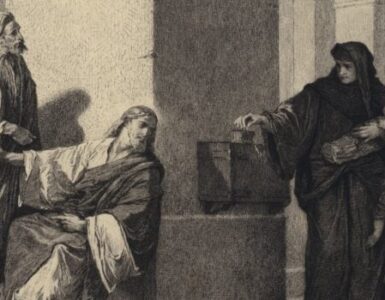One of the important lessons of the spiritual life is that we must learn that God alone is reliable and trustworthy. Human beings, in our sinful and fallen state, are unreliable and fickle. One moment people are close friends, spouses, co-workers, neighbors, or family and the next moment they want nothing to do with us.
At a macro level, there is an unraveling going on at all levels of society, including within the Church, that is destroying trust in authority and in people in general. The capriciousness, evil, indifference, shallowness, and corruption that is constantly being revealed has deeply wounded people’s trust in those in positions of authority.
This same battle is going on within families who are embroiled in similar issues. Divorce has decimated multiple generations’ trust in the institution of marriage. Cancel culture has led people to cast off those who do not agree with their political beliefs. People are often abandoned in moments of great need over shallow disagreements or indifference. There is a disintegration of relationships going on at an alarming rate within Western countries—all of which is increasingly disorienting.
St. Therese has the ultimate answer for how to navigate the fallen human heart: we must put our faith and trust in God alone. We cannot trust in human beings who are prone to unreliability and shallowness. By keeping our gaze fixed on Him, we will find healing and rest in Him.
St. Therese loved others very deeply during her earthly life and continues to do the same from heaven. She was loyal and dependable. She was the kind of friend we all long for but that seems so difficult to find in this life. When she was younger, she thought other people were like her in this regard, but she quickly discovered this was not the case. She shares the story of a fickle friend in The Story of a Soul:
During playtime, I was quite happy to watch the games of the others from a distance, while I thought about serious things; that was what I liked doing most of all…At other times I used to tell stories, and even the bigger girls came to listen; but as we were supposed to be exercising our bodies and not my tongue, it was just as well that our mistress forbade me to continue in my role of storyteller. I chose for my friends at that time two little girls about my age and learned from one of them how shallow mortal hearts can be. She had to go home to her family for several months. While she was away, I was very careful not to forget her, and I showed how pleased I was to see her again when she came back; but all I got from her was a look of indifference. She did not want me, and I felt it terribly. It was the last time I sought affection as fickle as hers, but God has given me such a faithful heart that once I love, I love for always, so I went on praying for her and love her even now.
St. Therese gives us a glimpse into how we must respond to others who hurt us. All of us experience at some point the indifference of people we love who do not love us in return. With the polarization of our culture, decades-old relationships are ending over a single tweet. The world we live in does not value friendship in a meaningful way. Love has been reduced to something egotistical, nihilistic, emotional, and utilitarian.
The first thing we learn from St. Therese is to recognize the fickleness of the human heart. Every single one of us is a sinner. Every one of us has been unreliable at some point. There are many shallow people in the world, including within the Church. We may think that someone cares about us and understands us, but when a separation or difficulty arises, we quickly learn how little people care about us. This is painful, but we must learn to not be surprised. This practical approach to fallen human beings helps us navigate future rejections because we recognize that people will let us down. Knowing this truth allows us to maintain greater peace when relationships fail.
The second thing we notice from St. Therese’s example is that she does not cease to love even when she is rejected by someone. It can be very difficult to go on loving someone who has either rejected or betrayed us. That wound very quickly turns us from the warmth of affection to the coldness of anger. St. Therese shows us the way out of unforgiveness and woundedness.
That way is love. We can still will the good of someone who has hurt us. The truth of the matter is that the person may be in great need of our loving prayers because a shallow soul is one that can easily fall away from the Lord. People who love little tend to fall into spiritual danger, so our prayers become a duty for their sake. The Lord can use our love to save souls.
St. Therese’s way of love is also the healing remedy the Lord uses as a salve to soothe the stinging pain of rejection. He uses rejections and betrayals to teach us how to love as He loves. The more we step out of our pain and offer prayers and sacrifices for those who hurt us, the more quickly we advance on the path to holiness. Even though it may be an all-out war in the beginning after a particularly grievous rejection, the more we lovingly offer prayers for those who hurt us, the more peace and joy we find in time. He gives us the graces to forgive. We discover that it is not vengeance that frees us but forgiving love.
The third lesson we learn from St. Therese’s example is that ultimately, we can only rely on and trust in God alone. St. Therese continues her childhood experiences:
I thank Our Lord that He let me find nothing but bitterness in human affections. I should have been caught easily, and had my wings clipped, and then how could I have “flown away and been at rest”? (Cf. Ps. 54:7) How can a heart taken up with human love be fully united to God? I am sure it is not possible. I have seen so many people attracted by this false light, fly to it as moths do and burn their wings, then flutter, wounded, back to Jesus, the Eternal Fire which burns without consuming.
St. Therese had a religious vocation, so she did not have the obligations of human connections within marriage. She does highlight a danger that can occur for those of us in the vocation of marriage, which is to put human love in the way of God. Our spouse and children will inevitably hurt us and let us down, and we will do the same to them. This is why we must keep our gaze fixed on Christ.
St. Therese’s lesson is still an important one for us even though marriage and religious life have differing requirements in human relationships. She reminds us that we must seek God for our rest and fulfillment. Even our spouse and children can never be our ultimate fulfillment. God alone can fill the void in our “restless hearts.”
It is God alone who is trustworthy. He knows our needs and the path He is calling us to in Him. He remains steadfast, even though we may waver and fall. He is our hope when relationships fall apart. As the Psalmist says:
Put no trust in princes,
in children of Adam powerless to save.
Who breathing his last, returns to the earth;
that day all his planning comes to nothing.
Blessed the one whose help is the God of Jacob,
whose hope is in the LORD, his God.
Psalm 146:3-5
As we navigate relationships at both the micro and macro levels within our culture, we must keep before us the truth that only God can be trusted and relied upon. There will be friends, family, co-workers, neighbors, and even clergy who will let us down or abandon us in moments of need. There will be times when relationships will dissolve overnight, and we will never fully understand why. These fraught times seem to be making solid friendships—and all relationships—more and more elusive by the passing day. Like St. Therese, we must trust in God alone because He will never abandon us.
Photo by Katherine Hanlon on Unsplash










